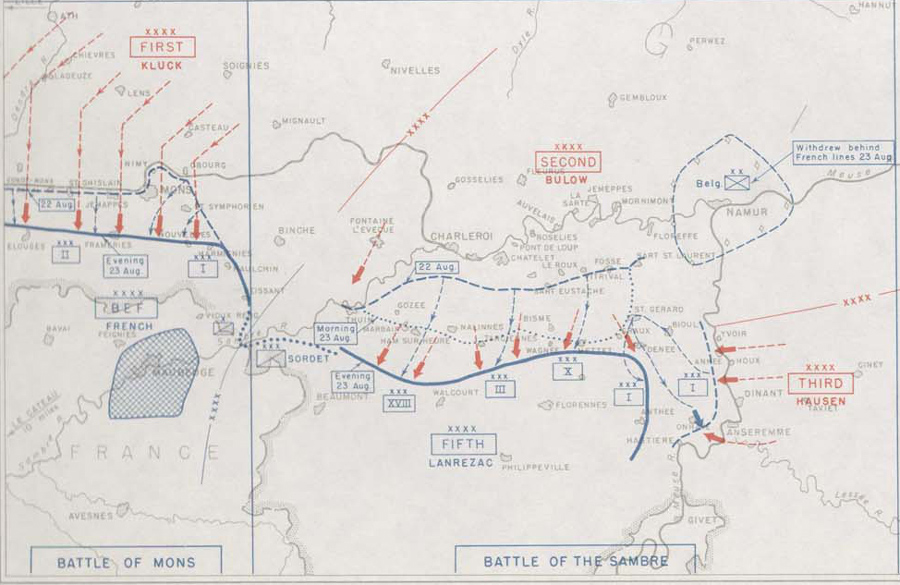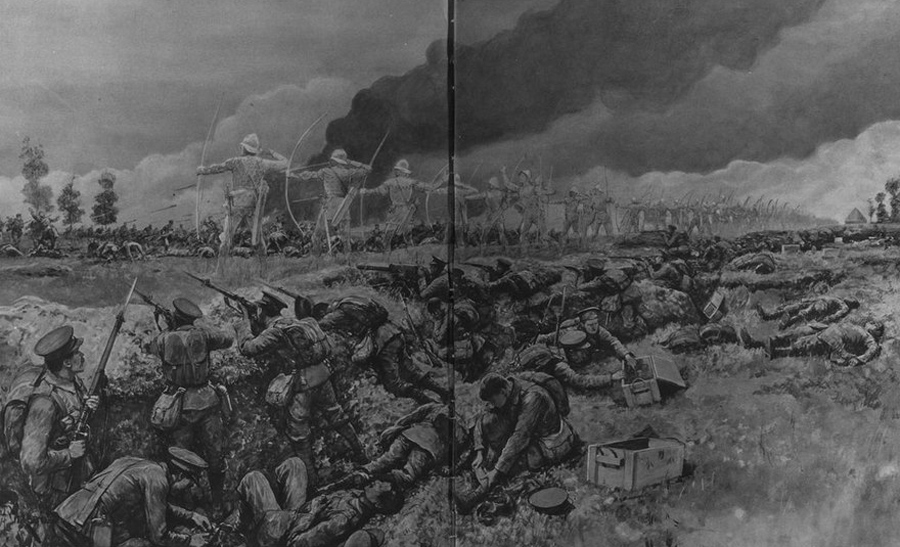The Battle of Mons was the first major battle fought by the British in the First World War, and for many a first taste of the horrors that were to come. The Germans, confident in their superior numbers, sought to overrun the British lines.
They had good reason to be confident. The British soldiers were largely surrounded and heavily outgunned and outnumbered by the advancing Germans. But, somehow, the British fought their way out of the deathtrap and escaped with their lives.
Rumors of this miraculous and impossible escape started to flow in even before the fleeing troops had returned to the camps. There were reports that the soldiers had seen angels, which came from heaven to guide them, and that they had escaped due to what became known as the Angels of Mons.
How did these soldiers escape against the odds? And what did they see, out there on the battlefield?
An Inescapable Trap
The British declared war on Germany on 4th August 1914, and advanced the British Expeditionary Force (BEF) quickly into position. The BEF was much smaller than the French or German armies and composed largely of seasoned soldiers.
Mons, in southern Belgium was a key town along the Allied line and the 80,000 men of the BEF reached it on 22nd August. However, they were unknowingly facing the key focal point in the German attack, an attempt to punch through the defensive lines and roll up the flank, quickly ending the war.

The British force was therefore facing an entire German army, with twice the artillery and three times the cavalry, as well as four corps to the British two. The French, fighting a pitched battle down the line at Charleroi, could offer no assistance to the British: the BEF was on its own.
- Faces of War: How the Tin Noses Shop Helped Disfigured Soldiers
- Charge of the Light Brigade: Tactical Blunder or Necessary Sacrifice?
On the morning of 23rd August the German attack started with an artillery bombardment. Although the German advance was slowed and many more Germans died in the assault than British, by the afternoon the British position had become untenable.
The British, fighting furiously, fell back before the German advance, and maneuvers continued into the night. The Germans were taking heavy losses but relentlessly kept coming, overrunning the British reserve positions on 26th August. They chased the BEF as they retreated for a further two weeks, before the British finally escaped.
The Angels of Mons
The British escape from the vast German army seemed almost unbelievable, and rumors began back at the camp that the soldiers had received some miraculous help. The first stories were that ghostly bowmen had helped the British soldiers, echoing the famous archers of Agincourt.
However soon the story became one of angels who had descended from the sky to save the British and repulse the German advance. People believed that the angels stopped Germans in their tracks to allow British soldiers to retreat, as there seemed no earthly explanation for the British escape.
Soon, the rumor that the soldiers had been helped by some celestial figures started to spread. Irrespective of whether it was a rumor or reality, both the British government and the Church of England started to use it as a motivation for soldiers to continue with their fight.
Descriptions of the Angels of Mons differed. As well as the archers and the celestial beings, some said they had seen a strange cloud throwing lightning upon the enemy troops.
The legend further states that this ghostly host had been summoned by the prayers of the people of Mons, coming down from the sky to stop the enemies and prevent them from closing to the British troops. Some soldiers even said that the German horses were rearing up and were braying at the angel army.
Rumor or Fact?
So, were the British soldiers aided by an angelic host as they fled before the German advance, and did St George himself descend from the heavens to save them? Sadly, the truth appears to be more grounded, if less inspirational.
Shortly after the battle, a writer of fiction called Arthur Machen had an article published in the London Evening News called The Bowmen, a fantasy about a British soldier who was helped by these archers from the sky. In the story St George, the patron saint of England, led the angels to the aid of the British soldiers.

This story, unfortunately presented in an ambiguous form, was taken as fact by many readers and helped to publicize the accounts of the Angels of Mons. As a result, the tale then spread around the locals in England, and people counted on it as fact.
Arthur Machen was at pains to point out that everything in his story about the Angels of Mons was just fiction. But by that time, it had entered into the public consciousness, a position cemented seven months later when the Spiritualist magazine published a similar story. Only this time, the story was portrayed as true.
Divine Intervention
In this way the true situation was blurred, with the fictional story having primacy but many of the faithful being convinced by subsequent reports of the truth of angels at Mons. Many soldiers who returned after the war also confirmed this angelic activity, which could suggest that Machen was also drawing on eyewitness accounts.
Mons shocked the British consciousness into sharp awareness of the horrors of modern warfare, and scarred the psyche of the country. Many stories started to circulate about this first battle of the First World War, such as that a giant hound stalking the battlefield.
But little evidence survives that directly corroborates the story, and which predates Machen’s article. Did the author speak to anyone on the battlefield before he published an article he considered fiction? Was there any truth to the story?
The answer sadly seems to be “no”. The angels of Mons, or the brave bowmen of Agincourt who rose from their graves to save the BEF, were a story after the fact to explain a miraculous escape, and to reassure the British public that God was on their side.
Top Image: Did angels save the British soldiers at Mons? Source: Warmtail / Adobe Stock.
By Bipin Dimri